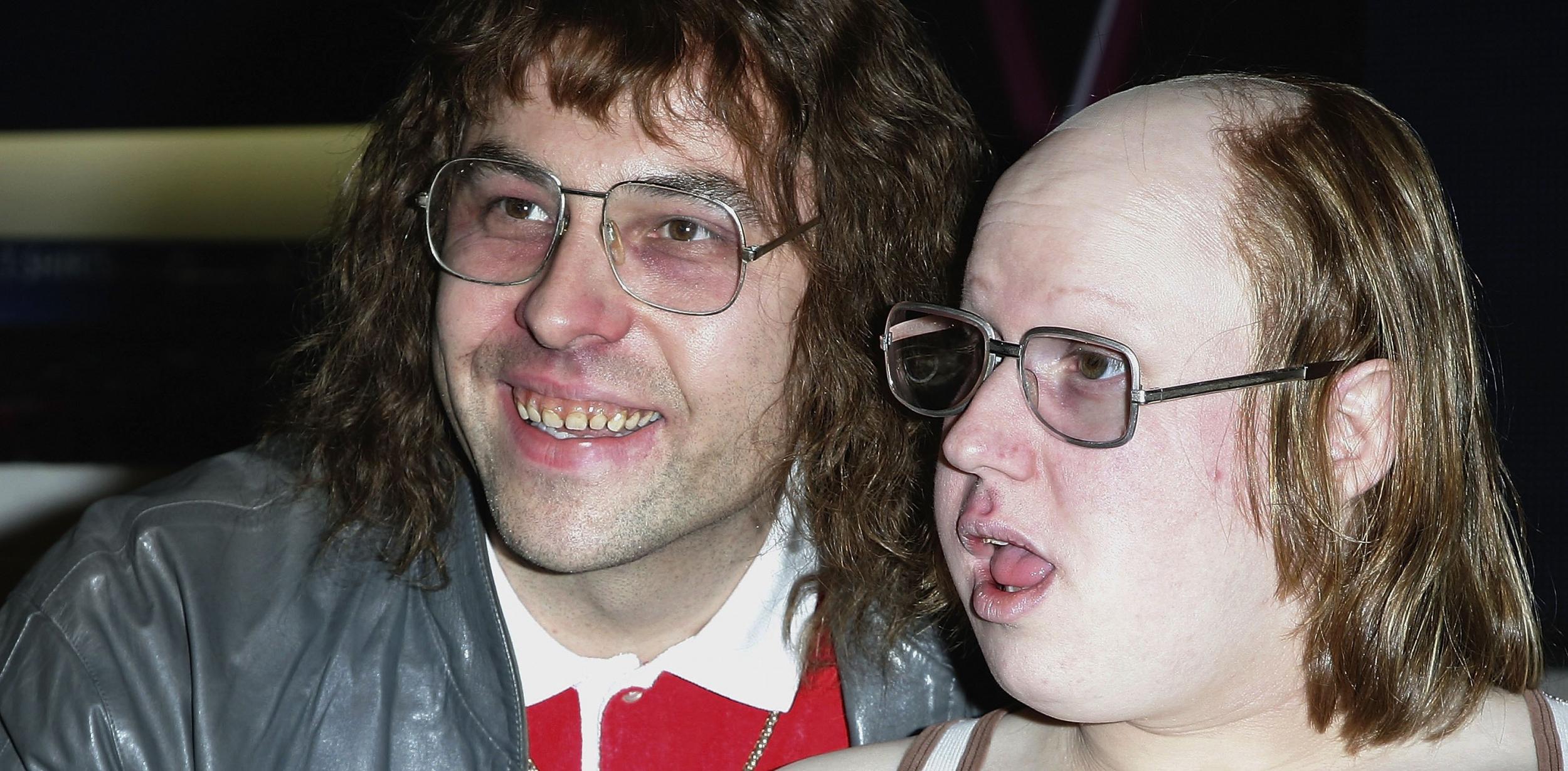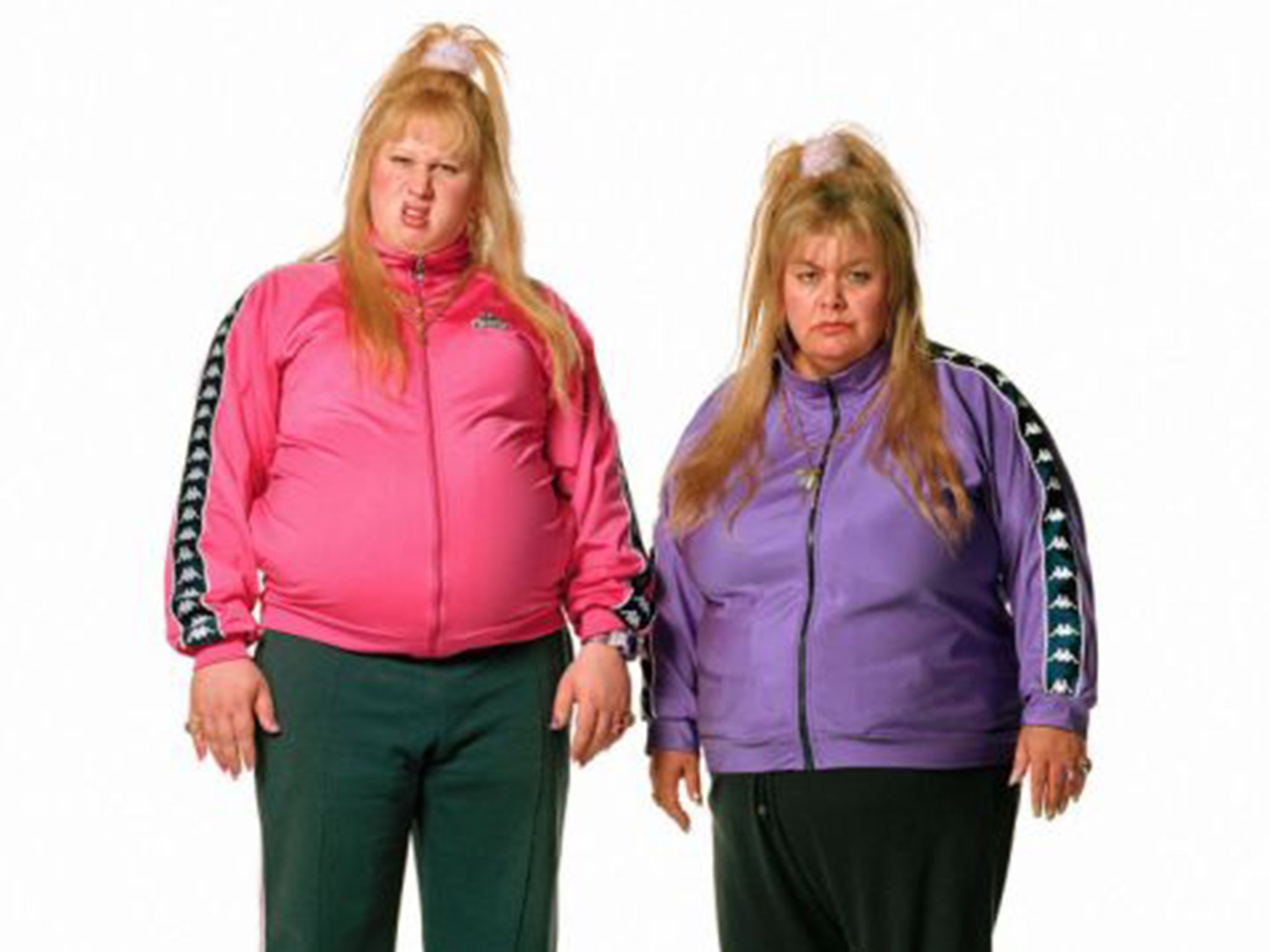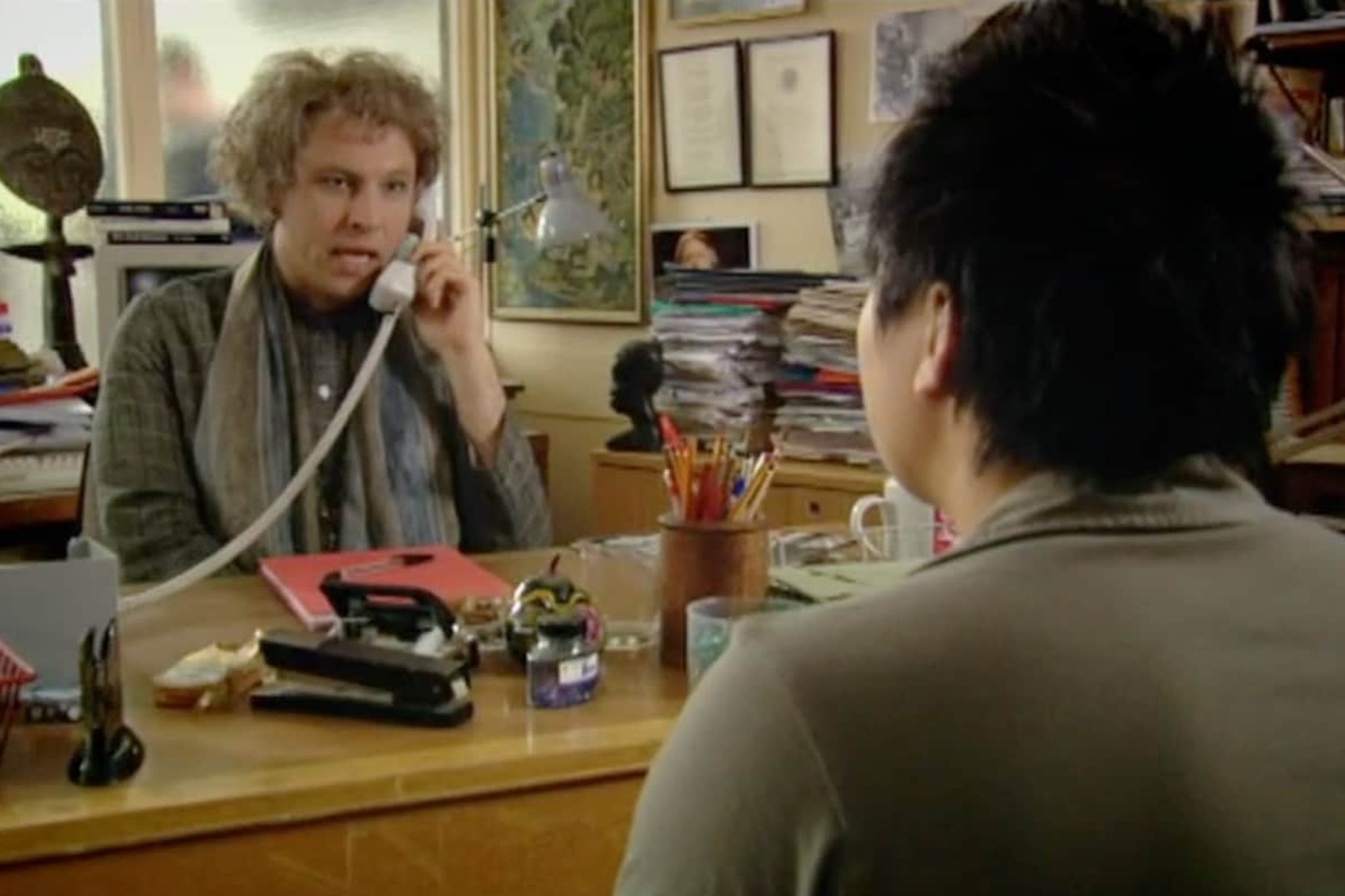Just five years ago, Little Britain, Matt Lucas and David Walliams’ sketch comedy that aired from 2003 to 2008, seemed doomed to be forgotten forever.
With its frequent use of racism, class-based stereotypes and controversial portrayals of people with disabilities, Little Britain always divided people. Johann Hari wrote of the show in The Independent in 2005: “The show is cluttered with ugly prejudices, and they are not ancillary to the jokes: they are the joke.” But, at its peak the show attracted nearly 10 million viewers and became a defining part of early Noughties British television. Taking inspiration from The League of Gentlemen, Little Britain was in many ways a traditional bawdy British sketch comedy, made in antithesis to the “political correctness” of the time. Known for its iconic catchphrases, Bernard Manning-style shock factor and humour that walked the very thin line between parody and punching down, it won multiple Baftas and even sold out a live arena tour.
In its heyday, Lucas and Walliams even described Little Britain as a celebration of diversity. “We’re everybody – tall, short, fat, thin, black, white, straight, gay, man, woman, whatever,” Lucas said in an interview in The Sunday Times in 2006. Up until early 2020, episodes were still being broadcast on TV. Then, in June of that year, when the BBC decided to pull the show, it stated: “Times have changed.” Notably, this was after the global rise of the Black Lives Matter movement.
Little Britain was taken down not only from iPlayer but all UK streaming platforms, including BritBox and Netflix, with the pair’s other series, the equally offensive mockumentary about a fictional airport Come Fly with Me, also removed. Both Lucas and Walliams appeared to show some remorse for their use of Blackface, stating that they “regretted [playing] other races”. “We want to make it clear that it was wrong, and we are very sorry,” the comedians said in a joint statement. By the time 2023 rolled around, the show was deemed “explicitly racist and outdated” by Ofcom.
But, in 2025, Little Britain has gained a new lease of life, with the show finding popularity on TikTok and new fans in Gen-Z. On the platform, the hashtag #littlebritain has accumulated over 61k posts, with short clips of the show constantly resurfacing and going viral. One such clip, with over 17k likes, shows the leader of a weight loss group, played by Lucas in drag, claiming she is unable to understand a South Asian woman’s pronunciation of “fish and chips”. “It must be some sort of dish we don’t get over here,” Lucas’s character says. Despite the blatant racism on display, the kind long ago ruled as unacceptable, people commented questioning how this show was ever cancelled.
Many of Little Britain’s new devotees will have only discovered the show in recent years. “I first watched a clip of it last year on TikTok,” 20-year-old Bradley* says. “I immediately thought it was great.” It’s a twist of fate we couldn’t have predicted: a show that was once veering on becoming a national embarrassment is now fuelling online content. But why are some of Gen-Z – previously thought of as part of that so-called “snowflake” generation – loving Little Britain today?
“Social media has introduced the show to lots of people my age,” says 17-year-old Callum*, who fell in love with the show during lockdown. Bored during his time off school, he decided to try out a new series. “I first watched it with my mum and dad; we were all laughing,” he says. Since then, he has seen every single episode several times. “It is absolutely hilarious,” he says. “Some of it has to be some of the greatest comedy ever to grace TV”.
Callum is forensic in his knowledge of Little Britain; he references specific scenes during our conversation and recites lines word for word. This won’t be the case for most new fans, though, with many having only watched snippets of the series in short bursts; TikTok videos usually last no more than a couple of minutes. “I’ve seen lots of clips of the show but never a whole episode,” Bradley says, “but I still get what the show is about”.

“[Gen-Z] are consuming the show in a micro form,” adds Chloe Combi, a Gen-Z expert and the author of Generation Z: Their Voices, Their Lives.“With shorts, you can take scenes out of context… but if they looked at the whole thing, they might think there is no place for it in 2025”.

Get Apple TV+ for £2.99/month for 3 months
Offer ends 24 April 2025. £2.99/month for first 3 months, then £8.99/month. Terms apply.
Accept offer
ADVERTISEMENT. If you sign up to this service we will earn commission. This revenue helps to fund journalism across The Independent.

Get Apple TV+ for £2.99/month for 3 months
Offer ends 24 April 2025. £2.99/month for first 3 months, then £8.99/month. Terms apply.
Accept offer
ADVERTISEMENT. If you sign up to this service we will earn commission. This revenue helps to fund journalism across The Independent.
It is possible, then, that Gen-Z isn’t watching the most offensive parts of Little Britain; the clip that Ofcom audience research deemed “explicitly racist”, for example, featured David Walliams as university professor Linda Flint describing a student as “the ching-chong Chinaman”. But, the show’s controversial comedy is clearly a pull for its young fanbase. “The shows I’ve watched that were made more recently don’t take as many risks,” says Bradley, “Little Britain pushes the boundaries of comedy in a way modern shows don’t”. Similarly, Callum thinks there hasn’t been anything on TV in the last five years that has reached the humorous heights of Little Britain. “If you don’t like the jokes in it, you don’t have to watch it,” he says simply.
Criticism always followed Lucas and Walliams’ shows. When Come Fly With Me was released in 2010, The Guardian described it as “tasteless comedy… not art by any stretch of the word, but mere exploitation of the artistic licence for cheap laughs”. Still, Callum believes it is unlikely that a show like Little Britain would be made now. “In today’s world, Little Britain is highly offensive,” he concedes. But it is this rude, daring, and risqué territory that makes it interesting to him. “The way I see it, it is just a comedy… it is just a joke,” he says, “the world has gone a bit mad about what we can laugh at and what we can do”.
@mattlucas.davidwalliams #littlebritain #davidwalliams #sketch #mattlucas #ukcomedy #ukhumour #marjoriedawes #fatfightersclub #fat
Hearing that the BBC removed Little Britain from streaming sites makes Bradley frustrated. “You can’t just censor stuff,” he says. “I don’t feel guilty about laughing at it because they are made-up characters,” adds Bradley – his favourites are Andy, who uses a wheelchair and his carer Lou, and Anne, a non-verbal patient in a psychiatric hospital.
Combi thinks that Gen-Z’s love for the show is part of a wider trend – a knee-jerk reaction to quote-unquote “wokeness”. “Things that were incredibly taboo to say, even a few years ago, have suddenly become normalised,” she says. It can’t be a coincidence that Little Britain’s resurgence also comes at a time when Gen-Z is romanticising and trying to recapture the Noughties in fashion, music and general aesthetic. “One of the more charming elements of Little Britain was that it had a real symbiotic connection to a more old-fashioned, bawdy style of humour,” Combi says. “I totally think that would appeal to Gen-Z who are obsessed with the Nineties and Y2K culture”.
With Little Britain’s newfound public favour, Walliams and Lucas have begun to talk about their show positively again. On their YouTube account run by BBC studios, where the duo have 172k subscribers, they regularly share what they describe as “classic clips” from Little Britain. Although they are no longer posting outwardly racist content, characters, including Vicky Pollard, who was much criticised for being a mockery of the working class, still feature regularly. In a recent interview with the presenter Lorraine Kelly, Walliams proudly declared that his 11-year-old son and his friends had been quoting Little Britain’s famous catchphrases in the playground. He even joked about the show’s previous cancellation, saying: “We’ve all been cancelled at some point. They can’t do it again.”

It’s a drastic change in attitude for the pair who previously distanced themselves from Little Britain during that initial backlash. In 2017, Lucas expressed regret about some aspects of the programme. “If I could go back and do Little Britain again, I wouldn’t make those jokes about transvestites,” he said at the time. And in 2020, when the show was being removed from platforms, they again apologised profusely.
Now, though, the comedy duo seem only too pleased to see their comedy on the rise again. In 2022, the series was put back onto BBC iPlayer, but with the scenes where Walliams is in Blackface edited out. A BBC spokesperson said: “Little Britain has been made available to fans on BBC iPlayer following edits made to the series by Matt and David that better reflect the changes in the cultural landscape over the last 20 years since the show was first made.” Still, characters including Lou and Andy, Vicky Pollard and Bubbles DeVere, who was played by Lucas in a fat suit, remain. More recently, Lucas and Walliams have even publicly said that Little Britain could return. But, what does this mean for the show that was once so shameful that the BBC tried to wipe it from public consciousness?
“Only a few years ago, we were getting tearful apologies from them,” says Combi. “Isn’t it interesting now that everyone has sort of forgotten about that, they’ve decided to rewrite history… how authentic was that apology then, really?” She understands why they’re changing their tune, “but I think that’s a very poor reflection of their characters because they distanced themselves from it when it was socially fashionable”. For now, though, this societal acceptance has its limits – attested to by the fact that the Little Britain lovers speaking in this piece requested that their names be changed.

Back in the early 2000s, Little Britain catchphrases ruled British playgrounds; children could be heard quoting it all across the country. And now, the show is well and truly back in the cultural lexicon, with the famous one-liners like “computer says no” still being used among some Gen-Z. It is telling, too, that many of the clips on TikTok are posted by Gen-Z themselves.
The account @Brit.lovers98, for example, which routinely shares clips of Little Britain, Benidorm and Mrs Brown’s Boys to its 123,800 followers, is run by 26-year-old Liam. Meanwhile, @Conzaa22, who also posts scenes from Little Britain regularly, is run by someone who is only 22. New merchandise made by fans, like mugs with characters’ faces on them, have also been created to be sold on TikTok shop. The spread of Little Britain’s modern fandom is coming from within Gen-Z.
In some sense, young people have always been drawn to this sort of bottom-of-the-barrel, vulgar humour. “I don’t think it is quite as popular with young people now as it was back in the day, but we are definitely getting into it,” says Callum. And, with Little Britain’s popularity on the rise, Combi thinks it won’t be long before we see more from Lucas and Walliams. “The whole revival is holding up a mirror to a very speedy transformation from very serious political correctness to a kind of freedom, where you can make quite tasteless jokes and observations”. For Gen-Z it seems like once-disgraced shows like Little Britain don’t have to be forgotten; just clipped up, repackaged and newly enjoyed.
*names have been changed



